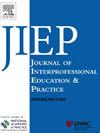Response-shift effect for self-assessment: Magnitude and accuracy within an interprofessional education course
Q3 Social Sciences
Journal of Interprofessional Education and Practice
Pub Date : 2024-10-05
DOI:10.1016/j.xjep.2024.100725
引用次数: 0
Abstract
Objective
Response-shift has described a shift in respondents' self-assessment following an impactful experience—where a respondent may initially score themselves higher than their true ability on Pre-assessment, though shifted/lowered their initial ability-score (on Post-assessment) after they learned further. While the psychological literature had described this ‘response-shift’ effect decades ago, our objective at this time was to evaluate the magnitude that response-shift was occurring in our interprofessional education (IPE) context and using our own self-assessment instrument.
Methods
Using a standard response-shift study design, first-year health-professions students within a foundational IPE course completed beginning-of-course (Pre) and end-of-course (Post) self-assessments based on that IPE course's student-learning-objectives; additionally at course-end, students completed a retrospective-beginning-of-course (RetroPre) self-assessment (to reflect and score themselves retrospectively for course's beginning). Paired t-tests compared each student's Post minus Pre (Conventional) versus Post minus RetroPre (Adjusted-effect); effect-sizes used Cohen's-d.
Results
Among 267 students, conventional change had a 0.5 effect-size (medium), while adjusted-effect change was 1.5 (very-large). Notably, some students’ conventional change was negative, though none of those same students reported negative-change in their adjusted-effect.
Conclusion
We found a substantial response-shift in our educational context, and evidence for improved accuracy. Moreover, RetroPre/Post appeared more efficient for students (as they could complete both in one sitting at course-end, instead of twice with conventional Pre/Post), and staff (no one needed to match each student's Pre and Post assessments).
自我评估的响应转移效应:跨专业教育课程的幅度和准确性
客观反应偏移描述了受访者在经历了有影响的经历后自我评估的转变--受访者最初可能会在前评估中给自己打出高于真实能力的分数,但在进一步学习后,他们会转变/降低最初的能力分数(在后评估中)。虽然心理学文献在几十年前就描述过这种 "反应偏移 "效应,但我们现在的目标是评估在跨专业教育(IPE)背景下,使用我们自己的自我评估工具时,反应偏移发生的程度。方法采用标准的反应转变研究设计,在一门基础 IPE 课程中,卫生专业一年级学生根据该 IPE 课程的学生学习目标完成课程开始(前)和课程结束(后)的自我评估;此外,在课程结束时,学生还完成了回顾性课程开始(RetroPre)自我评估(对课程开始进行回顾性反思和评分)。结果在 267 名学生中,常规变化的效应大小为 0.5(中等),而调整效应变化为 1.5(非常大)。值得注意的是,有些学生的常规变化是负的,但这些学生的调整效应变化都不是负的。此外,对于学生(因为他们可以在课程结束时一次性完成前/后评估,而不是传统的前/后评估两次)和教职员工(没有人需要匹配每个学生的前/后评估)来说,RetroPre/Post 似乎更有效率。
本文章由计算机程序翻译,如有差异,请以英文原文为准。
求助全文
约1分钟内获得全文
求助全文
来源期刊

Journal of Interprofessional Education and Practice
Social Sciences-Education
CiteScore
1.60
自引率
0.00%
发文量
80
期刊介绍:
Journal of Interprofessional Education & Practice, a quarterly online-only journal, provides innovative ideas for interprofessional educators and practitioners through peer-reviewed articles and reports. Each issue examines current issues and trends in interprofessional healthcare topics, offering progressive solutions to the challenges facing the profession. The Journal of Interprofessional Education & Practice (JIEP) is affiliated with University of Nebraska Medical Center and the official journal of National Academies of Practice (NAP) and supports its mission to serve the public and the health profession by advancing education, policy, practice & research.
 求助内容:
求助内容: 应助结果提醒方式:
应助结果提醒方式:


